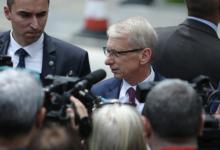Science and technology in Europe
Bulgaria's Dronamics Receives EUR 10 Million Boost from European Innovation Council Fund
In an exciting development for the Bulgarian company Dronamics, the European Innovation Council (EIC) has allocated an additional EUR 10 million under its EIC Fund for deep tech companies. This substantial investment follows a previous grant awarded to the drone manufacturer in 2022, as announced by Dronamics co-founder and CEO Svilen Rangelov during a recent online press conference.
Scientists launch hub to channel quantum power for good
Scientists will work to channel the huge emerging power of quantum computers for the common good at a new institute that opened in Geneva on Tuesday, its founders said.
The Open Quantum Institute is calling on researchers from around the world to pinpoint the most promising future applications for the fast-emerging technology — and ensure they are open and accessible to all.
Global Hellenism: A single research area
In 2000, the European Commission decided to create the European Research Area in order to promote closer cooperation between EU countries, facilitate the mobility of researchers, and enhance the innovation and competitiveness of research institutions. The European Research Council (ERC) and the Horizon Europe funding program are the fruits of this effort.
- Read more about Global Hellenism: A single research area
- Log in to post comments
Bulgarian PM: Balkans Competing Globally in Innovation
Prime Minister Nikolai Denkov delivered a notable address at an information day focused on financing high-tech scientific research and innovation, jointly organized by the European Innovation Council (EIC) and the Ministry of Innovation and Growth.
Turkish student participates in CERN experiment
Erdem Yiğit Ertörer, a 26-year-old Turkish Ph.D. student in the U.S., has realized his childhood dream to work at CERN by qualifying to participate in the Compact Muon Solenoid (CMS) experiment, one of the five major experiments conducted at CERN.
Doing his Ph.D. at Carnegie Mellon University, Ertörer is expected to spend about three years working on CERN's CMS experiment.
- Read more about Turkish student participates in CERN experiment
- Log in to post comments
EIT sets up info center in Cyprus
The European Institute of Innovation and Technology (EIT) is about to set up an information center in Cyprus, called the EIT Community RIS Hub and is already in search of a national secretary to lead and coordinate it.
The announcement was made on Wednesday at an info day event in Cyprus, co-organized by the EIT and the Research and Innovation Foundation (RIF).
- Read more about EIT sets up info center in Cyprus
- Log in to post comments
Agreement signed to boost companies’ involvement in CERN
Ljubljana – The Slovenian Chamber of Commerce and Industry (GZS) signed an agreement with the Ministry of Education, Science and Sport to cooperate in promoting Slovenian companies’ cooperation with CERN in Geneva, which operates the world’s largest particle physics laboratory and is the site of the world’s largest particle accelerator.
EU Commission: ‘Yes’ to nuclear & natural gas for the green transition
The Commission’s proposal has sparked significant controversy among EU Member States
Astronomers observed the closest pair of supermassive black holes to Earth ever
They used the European Southern Observatory’s Very Large Telescope (ESO’s VLT)
Supercomputer Vega launched in Slovenia
Maribor – Supercomputer Vega was formally launched in Maribor on Tuesday, putting Slovenia on the global map of computer super powers. It is the first in a series of eight planned high-performance computing (HPC) centres in the EU.
Vega is a 6.9 petaflops supercomputer, which means it can do 6.9 million billion computing operations per second, and it cost EUR 17.2 million.
- Read more about Supercomputer Vega launched in Slovenia
- Log in to post comments








